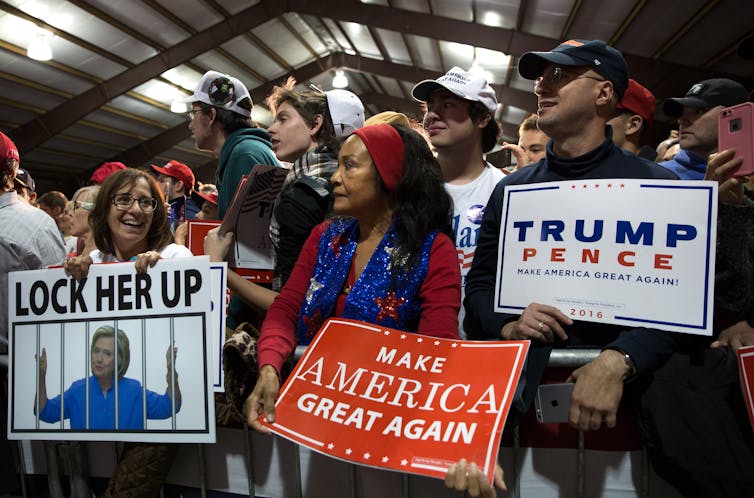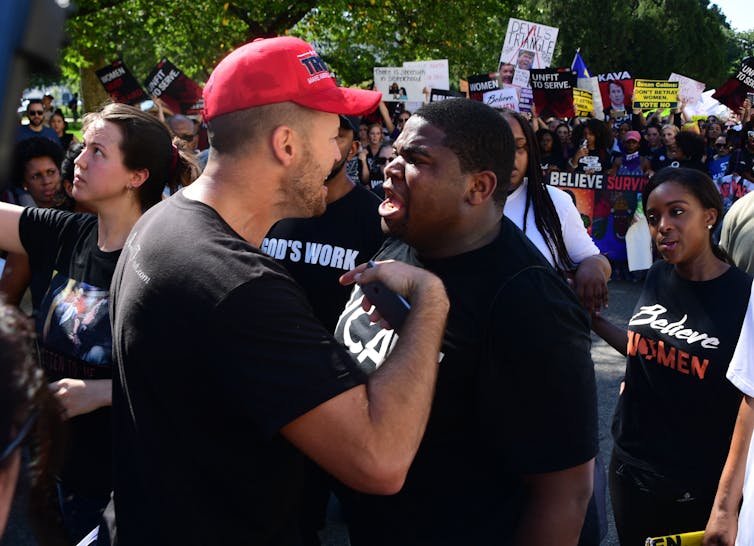
By Beth L. Fossen
Spending on political advertising is setting records in the midterm elections. But evidence shows that negative messages might discourage voters from casting ballots altogether.
As the 2022 midterms get closer, political attacks in campaign advertisements are on the rise.
In November, Rep. Paul Gosar shared an anime cartoon video showing him physically attacking Rep. Alexandria Ocasio-Cortez, a Democrat, and President Joe Biden.
That same month, Rep. Ilhan Omar called her Republican colleague Rep. Lauren Boebert a buffoon and a bigot on Twitter. Even the official White House Twitter account has gotten in on the politically divisive action, making recent headlines when it snapped back in August 2022 at several Republican members of Congress who criticized the Paycheck Protection Program – after they themselves had their loans forgiven.
Uncivil messages by politicians have become more and more common in the last decade. Political attacks are now a regular occurrence in an increasingly polarized political environment, encouraging voters to get mad and plan to vote ahead of Election Day in November.
But that doesn’t mean these kinds of advertisements and personal attacks actually work.
I study political marketing and, as a former campaign manager and political consultant, have seen politicians use uncivil strategies firsthand with the hopes of getting themselves elected. My research on political advertising suggests that highly polarized communications could be losing their persuasive power and can even backfire in the upcoming midterms, hurting a candidate’s chances.
The impacts of political attack ads
My research shows that political ads and language do indeed put people in a negative mood. Even simply asking voters to think about politics is enough to get them angry. This negativity is amplified if an ad specifically attacks an opposing candidate.
There is also evidence that this anger carries over to voting behavior. Data from U.S. elections from 2000 to 2012 shows that negative political TV commercials make people less likely to vote for the attacked politician, but also make people less likely to vote in general.
Politicians tend to use less negative, polarizing advertising on social media compared to their advertising on television, however. This might be because social media attracts a smaller, more targeted audience, and perhaps candidates fear that these kinds of tactics could demobilize supporters.
The rise of polarization
There are a few factors that help explain why political campaigns and attacks on opponents have become more toxic in recent years.
First off, voters are more emotional and angrier than ever before. This emotion about politics has been linked to the normalcy of anger in our day-to-day lives and increased political competition – for example, close presidential elections.
Democrats and Republicans in the U.S. are also interacting less and less. This social polarization comes as political identity is more important to voters than ever before. Being a Democrat or a Republican is a core part of who the voter is and shapes both their political decisions – like whom they vote for – as well as their nonpolitical ones, like whom they hang out with.
Given these factors, conversations about politics are increasingly happening among people who already agree on political issues.
Politicians like former President Donald Trump and others seem to be leveraging the fact that they are preaching to the choir, so to speak, and are using more and more polarized language to attack the other side.
Whether language is polarized or not is a subjective question, but my research and the work of others has focused on how negative a political message is and how extreme the message is.

David Hume Kennerly/Getty Images
The declining power of polarized messaging
There is some evidence that voters may be getting tired of negative political communications flooding their screens.
Using data from the 2016 U.S. presidential election, my collaborators and I found that political ad messages that are more polarized hurt candidates in the polls and lead voters to talk less about the candidate.
Specifically, we find that voters prefer more centrist and more consistent messaging in political ads, at least in the contexts of recent presidential elections. This research used text analysis methods, which allowed us to score each ad for how polarized the messaging was as well as how consistent the messaging was for the candidate.
Polarized messages particularly hurt a candidate’s election chances if they are off-brand for the candidate – that is, for politicians who are typically moderate, and then try to go extreme.

Jim Watson/AFP via Getty Images
Looking ahead to the 2022 midterms
There’s a lot at stake in the upcoming midterm elections in November 2022, as every House seat and about one-third of the Senate seats are up for grabs. A record-setting US$8.9 billion in political ad spending is expected for this midterm election season.
If the dominant tone of this messaging is toxic, political campaigns run the risk of disengaging more and more voters.
My research shows that there are emerging consequences of polarized communications that can hurt candidates in the polls. These insights may encourage political campaigns to test different ad strategies this midterm, perhaps curbing the negativity.
![]()
Beth L. Fossen is Assistant Professor of Marketing Kelley School of Business, Indiana University.





























America First 81 says
Obama started the ‘Great American Division’( which is a GiFT to Xi Jinping and the CCP Thugs)! We are ALL Americans therefore We Mustl UNITE to Defend America and it’s Constitution Against the EVIL Communist Empire of China which is Ruled by Xi Jinping(aka China’s Adolph Hitler)! Wake Up Americans, we are in a Deadly Cold War Against Communist China!
TrumpIsATraitor says
The orange man from Mara Lago wo formerly resided in the White House in Washington and lost the last election was and will always be a narcissistic grifter who has managed to convince millions of older white and uneducated people that anyone who doesn’t bow down and support his criminal enterprise is a leftist or a commie. How many women has this jerk abused and violated in his lifetime? He only ran for office to line his pockets with tax payers and followers monies. He doesn’t believe that laws applies to him. His latest gross statement (just yesterday) was to publicly state on his own social media channel (because he has been kicked off every other) that he should be second only to Jesus, the Christian son of God. Wake up people! He wants to make America great again FOR HIMSELF.